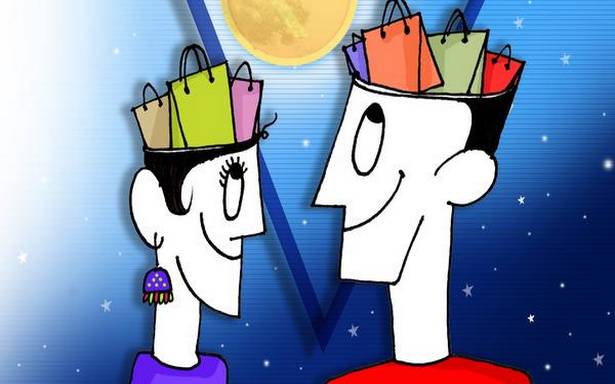Consumers have avariciously pounced jallikattu-style on the opportunity created by the sentiment
“Sensex kisses 50k mark,” a newspaper headline bashfully announced. The worst is over, and the RBI spots signs of a V-shaped recovery, predicted another.
As the effect of COVID-19-induced depressants wanes, there is heart-warming buoyancy in evidence everywhere, no less among consumers who are giving expression to their long pent-up craving for goods in no uncertain terms.
The bulls in the market have avariciously pounced jallikattu-style on the opportunity created by the sentiment. It has translated into, as it has always done, our gorging on unwanted goods, which will be stored and remain unused over time. How to reverse this manic possessive disorder? That is the question.
Efficient cure
I did not have to look too far in my search for an efficient cure. The previous day, during the last competitive episode in the current season of KBC, the popular game show, one of the contestants was asked a question about the “Ramanujan Machine”.
It turned out to be an algorithm developed by researchers from Technion (Israel Institute of Technology). It is actually not a machine but a concept named after the renowned Indian mathematician Srinivasa Ramanujan.
Typically, people provide the input and the algorithm finds the solution. The Ramanujan Machine reverses the process. So if a constant such as pi is fed into the machine, it will generate a series whose value will lead towards it.
New-age Alice
I began to dream, à la Alice in wonderland, whether, using the Ramanujam algorithm, it will be possible to convert unused goods into cash or back into my bank card.
It put me in mind of a hilarious story, much ahead of its time, which my father, in the mid-1950s, used to tell to regale captive audiences from time to time. It was about a shoe company in Kanpur, where we were living at that point in time.
Kanpur was once one of the main centres of the industrial revolution in India. Towards the end of the 19th century, Sir John Burney Allens established a group of companies under the banner of British India Corporation with its headquarters at Kanpur. The Flex Shoes Company, located in the vicinity of a newly developed posh colony of the township, was one of the jewels in that crown. In due course, it fell into bad ways and was ultimately taken over by the government and finally passed into history.
During its heyday, my father’s story goes, a Harvard-educated enterprising proprietor of the factory imported a machine which could convert cattle into shoes. You had to herd in sheep or goats or whatever from one end, and, lo and behold, beautiful shoes in different shapes, sizes and colours would emerge from the other, to be put tastefully in boxes and shipped to marketing outlets.
In today’s terminology, it would be called an Artificially Intelligent machine. So far so good.
Out came the sheep
One fine Sunday morning, the gentry in the neighbourhood of the factory woke up to find the streets infested with sheep and goats. Since the residence of the police chief was nearby, the constabulary investigated the matter post haste and found that a nightwatchman, in his drunken revelry, had switched on the factory’s engine in the reverse mode.
It had sucked in the stack of shoes stored nearby and out came sheep and goats from the wrong end.
Many a thing which existed only in human imagination not so long ago is today part of our day-to-day life.
Will then a time come soon enough when, using Ramanujan’s reverse algorithm, someone will invent a machine in which we may put in, at one end, the unused goods that we have purchased in a fit of manic possessive disorder and get them converted into cash or plastic money, at the other?
Only time will tell.
(The author is a former Secretary-General of the Rajya Sabha)
Source: Read Full Article

